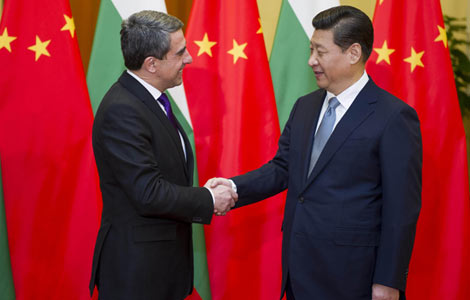IMF faults Congress' budget
Updated: 2014-01-16 08:29
By CHEN WEIHUA in Washington (China Daily USA)
|
||||||||
International Monetary Fund (IMF) chief and US government officials and experts voiced disappointment over a US Congressional spending bill that has made it impossible for the IMF to carry out reforms that give more voting rights to emerging economies such as China, India and Brazil.
IMF Managing Director Christine Lagarde said on Wednesday she hopes Congress will include the IMF in future steps it takes. "I very much hope it's a question of timing, and not a question of determination to exclude the IMF," she said at the National Press Club in Washington.
Lagarde described the IMF and its reforms as being in the interest of the world and especially the US itself, the largest shareholder and player at the international financial organization.
US lawmakers negotiated a $1 trillion spending bill on Monday that did not include funding for the IMF's 2010 quota and governance reforms.
The US government has been pushing Congress to approve a shift of $63 billion from an IMF emergency fund to its general accounts in order to fulfill the country's commitment made in 2010 to the reforms.
The IMF Board of Governors endorsed a quota and governance reform package in December 2010 that included a doubling of IMF quotas and a shift in quotas to dynamic emerging markets and under-represented countries. These countries are also expected to be better represented in the executive board, which oversees IMF's day-to-day operations.
The reforms have already been delayed in the past few years by US domestic politics, such as the presidential election and on-going feuds between Congressional Republicans and Democrats. The US, which holds the only controlling share of IMF votes, is vital for the IMF reforms.
Shortly after the Congressional spending bill negotiations on Monday, Lagarde said in a statement that she was disappointed that necessary steps could not be taken to implement this important governance reform.
"The world is evolving, and we are fully committed to helping our membership finalize what it agreed in 2010 is needed to ensure that the Fund keeps pace with global change and helps meet emerging challenges," she said.
"We understand that the US administration will continue to work on securing the necessary legislative authorization, and we are hopeful that this will happen," she said.
Lagarde said the IMF remains fully committed to pursuing implementation of the governance reforms that have been agreed on to make the Fund an even more effective and representative institution.
The IMF uses its resources to make loans to countries facing financial difficulties, such as those in Europe these days.
Douglas Rediker, a visiting fellow at the Peterson Institute of International Economics, described Congress' action as "a big slap in the face of the IMF by the US at a time when the US is trying to reestablish its global leadership both in the organization and more broadly".
"I think [it] probably is a pretty decent slap at President Obama's ability to go to these meetings in the future and make commitments when others will look at them and say, 'Well, we don't know if you can deliver on them,'" Rediker said in an audio clip posted on Peterson Institute's website.
Rediker, who represented the US on the IMF executive board from 2010 to 2012, believes that countries that don't get voting rights may now seek other means to exert their influence, but he did not know what those means might be.
Rediker said some members of Congress who oppose the Obama administration are seeking to extract concessions through this action, but he admitted he did not know specifically what those concessions might be.
US House Appropriations Committee Chairman Harold Rogers, a Republican, told reporters on Tuesday that the IMF provision was not in the bill because "it's a huge monetary item, fiscally — $63 billion. It's no small matter".
The US Treasury Department also expressed its disappointment at the bill.
"The US remains committed to implementing the 2010 quota and governance reforms, and we are examining options to do so as soon as soon as possible," Treasury spokeswoman Holly Shulman said.
The US now has a controlling voting share of 16.75 percent at the IMF, compared with China's 3.81 percent. Countries such Japan, Germany, France and Britain also have a higher share than China's but substantially lower than the US'. IMF reforms intend to trim Europe's over-representation, but the US will remain the single largest player.
chenweihua@chinadailyusa.com

 Detroit auto show features fuel-efficient cars
Detroit auto show features fuel-efficient cars
 Palestinian students show military skills
Palestinian students show military skills
 Cristiano Ronaldo wins FIFA best player award
Cristiano Ronaldo wins FIFA best player award
 Xuelong carries on mission after breaking from floes
Xuelong carries on mission after breaking from floes
 Beijing and Sofia vow new initiatives
Beijing and Sofia vow new initiatives
 71st Golden Globe Awards
71st Golden Globe Awards
 Bangkok unrest hurts major projects and tourism industry
Bangkok unrest hurts major projects and tourism industry
 No pant for cold subway ride
No pant for cold subway ride
Most Viewed
Editor's Picks

|

|

|

|

|

|
Today's Top News
China seeks to calm US fears over missile
Doubt on Tokyo's diplomatic push
China Mobile and Apple 'tie the knot'
Russia battles terror before Olympics
China vows reform to curb corruption
Corrupt officials beware this New Year
Shanghai schools to close on heavily polluted days
Air China ups Houston-Beijing service to daily
US Weekly

|

|






